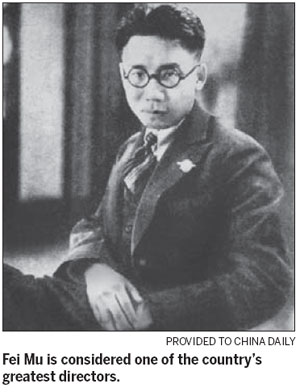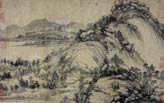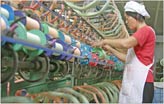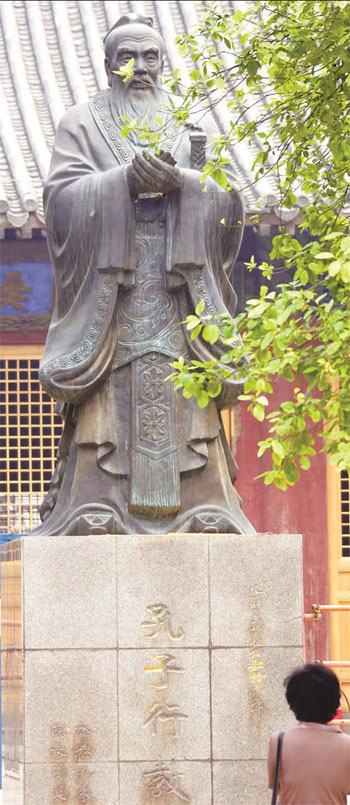Movie
Restored for posterity
Updated: 2011-06-14 08:05
By Liu Wei (China Daily)
|
A stone statue of Confucius in Beijing. Fei Mu was the first Chinese director to film a movie about the country's most influential thinker. Luo Wei / For China Daily |
A restoration of the 1940 biopic of Confucius by the director Fei Mu, thought to have been lost, means the film can now take its rightful place in history. Liu Wei reports.
When an anonymous person called the Hong Kong Film Archive to donate the negative of Fei Mu's 1940 film Confucius in 2001, Sam Ho's first thought was, "It's too good to be true".
Ho, the archive programmer who collects and preserves artifacts from the city's rich film history, had long heard rumors the lost masterpiece was in Hong Kong. He says the donor found a set of metal film canisters among the belongings of a relative. They were labeled "Confucius".
The cans had a pungent almond aroma, the distinctive smell of nitrate film stock used before the 1950s. When Ho and his colleagues opened them, they realized they had the nitrate negative of Fei's Confucius.
The film, which premiered in 1940, was considered lost in the chaos of the following decades. No copy was known to have survived - until the donation.
After restoration, the film was screened during the Hong Kong International Film Festival in 2009 and more recently at the Ullens Center for Contemporary Art (UCCA), in Beijing.
Fei, born in 1906, is not a household name now, but in his time he was a widely respected filmmaker because of his erudition and meditative art style.
Among today's classic Chinese cinema fans, he enjoys a great reputation. In 2005, Hong Kong's Film Awards Association voted his melancholy love tale Spring in a Small Town the greatest Chinese film of all. In 2002, the mainland's renowned art film director Tian Zhuangzhuang remade the film.
Fei was also the first Chinese director to touch on the subject of Confucius (551-479 BC), probably the country's most influential thinker.
The film is an important element of Fei's portfolio, Ho says, because it provokes inspiring thoughts about the time in which it was made and the fate of its director.
In 1937, Shanghai fell during the War of Resistance against Japanese Aggression (1937-1945). Fei fled for Hong Kong, where he mingled with friends equally passionate about film, such as Jin Xinmin, a seafood and herbal medicine merchant. They decided to make a biopic of Confucius at a time when traditional Chinese culture was under attack by Japan's invasion and the May Fourth Movement, which largely promoted Western values.
Returning to Shanghai in 1940, they started filming. Jin sold enough of his stock to "buy a whole street", Fei's daughter Barbara Fei told the Hong Kong-based newspaper Wen Wei Po. But their pursuit of perfection led to the film overrunning its budget.
"For a snow scene, Fei would wait for days for real snow," Ho says. "The film was only about 90 minutes, but it cost several times the usual budget of a film at that time."
Shanghai had a robust movie scene even during wartime. But the period costume dramas of the day did not show a respectful attitude toward history and culture. Fei and his friends would buck the trend.
"Fei was a junzi, or an 'intellectual gentleman' in Chinese," Ho says. "One of the traits a junzi boasts of is a sense of mission. They believe they should worry about and do something for the country."
The slow and sometimes somber film starts with the ancient state of Qi's foray into the state of Lu, which reminds the audience of Japan's invasion of China. And as Ho found in newspapers at that time, viewers burst into applause when a character condemned a traitor by saying: "You are selling out your own country!"
"The audience must have thought of traitors at that time," Ho says.

But in Fei's interpretation, the thinking man is not worshipped as a saint, but rather as some kind of loser cursed by his rivals as "a stray dog". He travels among states, lobbying rulers to practice his doctrines but is never really understood and respected by them. There are not only plenty of presentations of his beliefs, but also scenes of him being attacked from all sides.
"The film depicts how a man with vision is alienated in his time," Ho says. "More or less, it speaks of something inside Fei himself. He was a revered filmmaker, but not a box office champion in his time. After the film premiered in 1940, some proponents of Confucianism disliked his portrayal of their sage, while opponents of it thought he was a fogy."
Ho does not think it is Fei's best film, but points out its close connection with the social reality and the fate of Fei himself makes it an important work to better understand the filmmaker and his time.
The film was sent in 2008 to L'Immagine Ritrovata Film Restoration Lab in Italy, put in a special box to protect the combustible negative and escorted by the restoration team of the Hong Kong Film Archive on the flight. Those who guarded it on the plane were specially trained and had to apply for a license.
In Italy, the shrunken and partially liquefied negative was first given a chemical bath to deal with the scratches on it.
After painstaking communication with the Italians about the soundtrack, which is in a half-ancient Chinese language, the team added both Chinese and English subtitles to the film.
Still, Ho believes more improvement is needed. For example, the sound for the opening scene was damaged. A scene described in Fei's production notes was also lost.
In the donated canisters, Ho and his colleagues also found eight segments totaling nine minutes. They have tried their best to reintegrate them into the film, according to the production notes, newspaper reports of the time, and the code and cut on the negative. Yet Ho is still not sure if it is accurate.
Therefore, every time he screens the film in public he suggests the audience look through their old family items to see if they can find something related to the film.
"The restoration of old films is part of preserving our culture," he told a full house at UCCA on May 27. "And the spirit of restoration is that it's an endless process. Every time we find a new version or improve a current version, we feel a new wave of joy."
Specials

When two are one
After a separation of 360 years, Huang Gongwang's famous Dwelling in the Fuchun Mountains has been made whole again.

Wealth of difference
Rich coastal areas offer contrasting ways of dealing with country's development

Seal of approval
The dying tradition of seal engraving has now become a UNIVERSITY major
